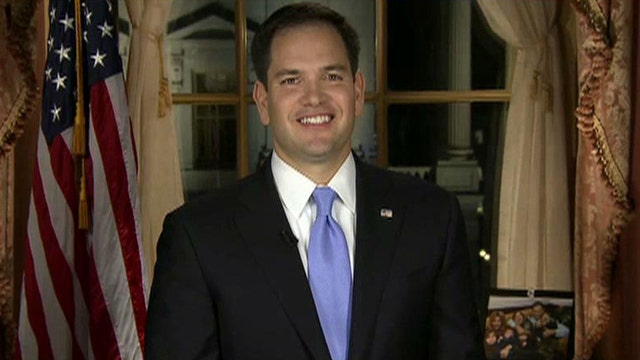Sen. Rubio gives GOP response to State of the Union
Florida lawmaker: More government isn't going to help you get ahead
Florida Sen. Marco Rubio said Tuesday night he hoped President Obama would “abandon his obsession with raising taxes” and pursue policies to promote economic growth, in the official Republican response to the president’s State of the Union address.
"Presidents in both parties -- from John F. Kennedy to Ronald Reagan -- have known that our free-enterprise economy is the source of our middle-class prosperity. But President Obama? He believes it's the cause of our problems," Rubio said.
Rubio’s high-profile speech, given for the first time in both English and Spanish, could broaden the GOP’s appeal among minorities. Rubio has been one of the rising stars in the Republican Party and has taken a leadership role on key issues such as immigration.
“I still live in the same working class neighborhood I grew up in,” Rubio said. “My neighbors aren’t millionaires. They’re retires who depend on Social Security and Medicare. They’re workers who have to get up early tomorrow morning and go to work to pay the bills.”
He added, “They’re immigrants who came here because they were stuck in poverty in countries where the government dominated the economy.”
Rubio, though, focused as Obama did on the economy. He went on to say the tax increases Obama and Democrats are proposing will “hurt middle class families.”
“It will cost them their raises. It will cost them their benefits. It even cost some of them their jobs,” Rubio said.
Tapping Rubio to give the GOP response demonstrated the party’s confidence in him and signaled an effort on their part to make it more inclusionary. Rubio, who delivered the English part of his speech live, started strong but seemed to get slightly winded midway. He awkwardly took a sip of water during the speech, before completing his address.
“Mr. President, I don’t oppose your plans because I want to protect the rich,” Rubio said. “I oppose your plans because I want to protect my neighbors.”
Rubio was on the short list to be 2012 Republican presidential nominee Mitt Romney’s running mate. Romney opted for Wisconsin Rep. Paul Ryan, but exit polls suggested their message did not resonate with many minority voters, especially Hispanics. During last year’s elections, Democrats carried the Hispanic demographic with more than 70 percent of the vote.
The State of the Union regularly draws one of the largest television audiences for any national political event and Tuesday’s speech gave Rubio the chance to test his role as a negotiator on a national stage.
The first official televised opposition response to a president’s annual address came in 1966, when Senate Minority Leader Everett Dirksen, R-Ill., and House Minority Leader Gerald Ford, R-Mich., offered a critique of President Johnson’s annual message before Congress.
Between 1967 and 1986, the opposition response was delivered in a variety of formats. Some included comments from one or more members of Congress. In 1970, seven Democrats participated in a 45-minute televised response to President Nixon’s speech.
Rubio has said the nation’s broken immigration system needs to be fixed, and is part of a bipartisan Senate group trying to hammer out a new policy.
Rubio has announced he supports a limited pathway to citizenship for undocumented immigrants as long as they pay a penalty, don’t jump ahead of legal immigrants and the borders are secured.
Following Rubio was Kentucky Sen. Rand Paul, who delivered the Tea Party response from National Press Club in Washington. His speech was also streamed live on the Tea Party Express website.
Paul, who took shots at both Democrats and Republicans in his speech, said he’d urge Obama and Congress to allow $1.2 trillion in cuts to domestic and military programs as a step that needs to happen if the country wants to reduce its debt.
“Both parties will have to agree to cut, or we will never fix our fiscal mess,” Rand said.
He also addressed immigration and told Tea Party members to embrace the cause.
“We must be the party who sees immigrants as assets, not liabilities,” he said. “We must be the party that says, ‘If you want to work, if you want to become an American, we welcome you’.”
The Tea Party tradition of offering a response in addition to the GOP response was started two years ago by Minnesota Rep. Michele Bachmann. Last year, presidential candidate Herman Cain led the charge.
“Americans are fed up with Washington politics that fail to address America’s fiscal woes,” said Amy Kremer, chairwoman of Tea Party Express. “Both Sen. Rubio and Sen. Paul will articulate pro-growth messages that will resonate with the American people.”
Both Paul and Rubio, considered potential 2016 GOP presidential candidates, won Senate seats during the 2010 mid-term wave elections in which Republicans, with the Tea Party’s momentum, took control of the House.












































